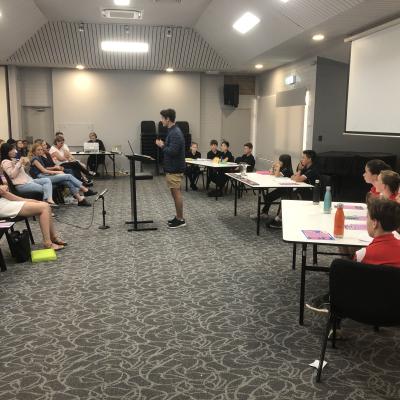Competition Information
The Premier's Debating Challenge is open to all NSW government schools with the aim of developing the reasoning and public speaking skills of students from Years 5 to 12.
- What age groups can compete in the Premier's Debating Challenge?
- How do the debates work?
- How long do the students speak for?
- How many teams can a school enter?
- Who can be in the debating team?
- Additional support for students
- How do schools enter the challenge?
- How much does the challenge cost?
- What are the prizes?
What age groups can compete in the Premier's Debating Challenge?
The Premier's Debating Challenge has four different state-wide age divisions: Years 5 and 6, Years 7 and 8, Years 9 and 10, and Years 11 and 12. You can find out more about how the different age divisions run by visiting their pages using the links to the right or by downloading the detailed information available at the Speaking Competitions Hub.
How do the debates work?
Every debate in the challenge is a one hour preparation debate. Teams do not know the topic or which side of the debate they are on until one hour before the debate starts. Once the preparation time is up, three speakers from each team take turns to speak, with a fourth teammate helping out during both preparation and the debate. Debates can be held in-person or online to suit the schools involved.
How long do the students speak for?
The speaking times differ in each age division of the challenge as outlined below.
| Age division | Warning bell | Speaking time | Continuous bell |
|---|---|---|---|
| Years 5 and 6 | 3 minutes | 4 minutes | 5 minutes |
| Years 7 and 8 | 4 minutes | 6 minutes | 7 minutes |
| Years 9 and 10 | 6 minutes | 8 minutes | 9 minutes |
| Years 11 and 12 | 6 minutes | 8 minutes | 9 minutes |
How many teams can a school enter?
Schools can enter up to two teams in each of the age divisions. Many schools choose to enter two teams in the Years 11 and 12 division, two teams in the Years 9 and 10 division, and two teams in the Years 7 and 8 division so that a large group of students throughout the school can be involved and work together on their skills.
Who can be in the debating team?
In any given debate a team will field four members. Those members can change from debate to debate, so a team can in fact be made up of a large squad of students. The students can be from any year equal to or below the age division in which the team is entered (for example, a Year 10 student can debate in a Years 11 and 12 team). When a school enters two teams in the same age division, a student cannot appear for both of those teams, so Team (A) needs to have a different and separate squad from Team (B).
Additional support for students
The Premier’s Debating Challenge is an inclusive competition. If for whatever reason students in your team will require support to enable them to participate in debates, please contact the Speaking Competitions Officer before your debate so that we can assist.
How do schools enter the challenge?
Schools can enter the challenge by completing the online entry forms which can be found using the red button at the top of this page. For the Years 11 and 12 age division the deadline to enter is Wednesday 21 February 2024. The deadline for the other divisions is Wednesday 6 March 2024. We’ll email you as soon as we’ve processed your school’s entries.
How much does the challenge cost?
The entry fee for the Premier's Debating Challenge is $100.00 per team. Schools will automatically be debited for this amount once they submit their entry form. Please advise your school’s finance department that this will occur, and note that fees are due on entry and cannot be refunded even where teams might subsequently withdraw.
What are the prizes?
All students involved in the challenge will receive a certificate acknowledging their participation. Certificates of congratulations will then be awarded to teams who win their zones. Medallions will be awarded to teams who reach the state final, and a perpetual trophy will be awarded to the state champions in each age division. All competition finalists and winners also receive a stationery prize pack from ACCO Brands Australia.
